



What does a teenaged daughter do if her mother is suicidal? She grows up beyond her years. She’s always on guard, with an eye on her volatile mother. She’s lost in thoughts in her class. She has few friends, with whom she could share her situation. Indu Lakshmi’s sophomore Appuram (The Other Side), which won the Best Debut Director and Special Jury Mention for performance at the 2024 International Film Festival of Kerala (IFFK), and tells the story of Janaki (Anagha Ravi), her mother Chithra (Mini IG) and father played by Jagadish. For the director, Appuram is a deeply personal film. It birthed from her own reality. After New York Indian Film Festival in June and Indo-German Filmweek in Berlin in July, Appuram will next screen at Regional International Film Festival of Kerala (RIFFK) in Kozhikode from August 8-11, followed by the Indian Film Festival of Melbourne (IFFM) from August 14-24.
For Lakshmi, making Appuram was “cathartic; a very special experience”. “I don’t know if in another movie I’ll have that kind of a connect because I was seeing myself here. I was seeing my own life, the geography of the house, everything was so similar. It was like reliving my own life and seeing that objectively, which was very challenging for me,” says Lakshmi, who made her actors Mini and Ravi spend time just talking and bonding at the house in Venganur (in Kerala), which was very similar to Lakshmi’s ancestral/maternal grandparents’ house with its old, suffocating structure.
Mini IG is a veteran actor with 25 years of theatre experience. “For her character, I knew the look exactly, the sari, the bindi,” says Lakshmi, “Each of her dialogue had a different metre and tone. In the balcony scene, where the mother sits and combs her daughter’s hair (inspired from a real-life moment between Lakshmi’s sister and late mother), the mother utters broken sentences. She’s lost in thoughts. Then there’s a sudden shift when she talks about her father. There’s anger, followed with grief.”
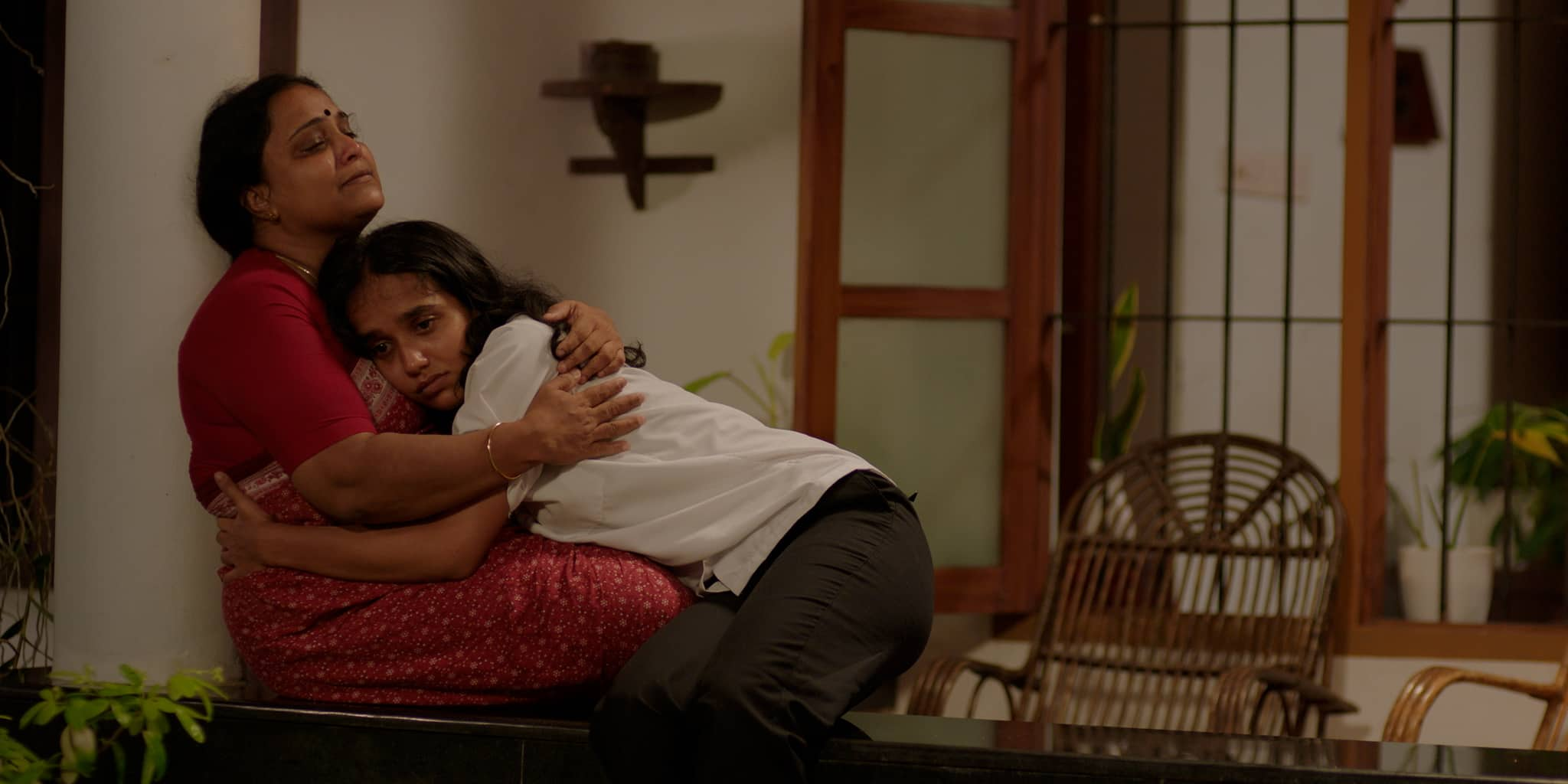 A still from 'Appuram'.
A still from 'Appuram'.
In the film, the menstruating daughter — seen as a bad omen — is confined to the attic of her maternal grandparent’s house, prohibited from attending her own mother’s funeral. From Kerala to Bengaluru, girls have reached out to Lakshmi to relate their own tales. “It’s still happening. But nobody wants to talk about it. And there is a guilt feeling that these women have. It’s ingrained in them that they are not supposed to do the forbidden thing, to go near the body when menstruating, because it is bad for the departed soul,” says the filmmaker, whose own sister could attend their mother’s funeral rites with restrictions. “Janaki is actually a combination of me and my sister. Of the pain which we have gone through. I used to be always worried, checking our mother’s breath now and then to see if she’s alive,” says Lakshmi, “Memories stay. I have made this movie, but it still haunts me. It doesn’t go away. By trying to tell a story like this, you kind of shed that baggage. During the shoot, it broke something within me but I know it’s all between action and cut,” she adds.
Shot over nine days, “the actors had absolutely no idea that I was trying to recreate something which I’ve actually seen/lived through. Only my cameraman Rakesh (Dharan) and I knew what we were building. He knew time is money so, after every scene, he’d immediately shift the lighting to the next one. If I did not have Rakesh, I would not have been able to do Appuram,” says Indu Lakshmi, who lives in Germany now.
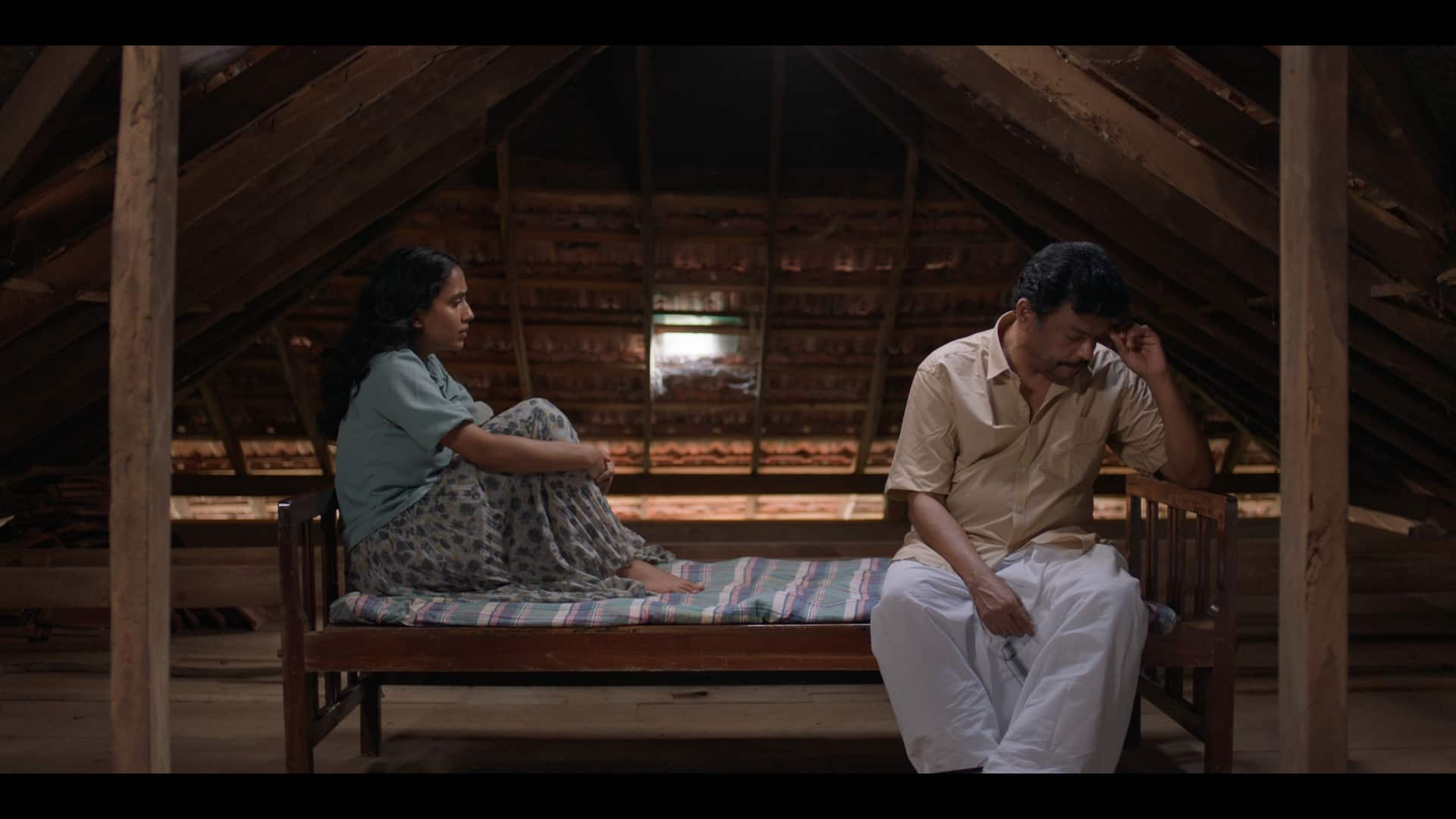 Anagha Ravi and Jagadish in a still from 'Appuram'.
Anagha Ravi and Jagadish in a still from 'Appuram'.
“If I had not done Appuram, I would not be alive today to talk to you. I would have got so destroyed and I was not willing to get destroyed. This is my comeback, my survival. This is the breath which I dared to take. I’m glad that it could reach so many people through the festivals,” says Lakshmi, whose first film Nila (2023) was awarded funding of Rs 1.5 crore, based on the script’s merit under the state government’s flagship initiative ‘Films Directed by Women’, overseen by the Kerala State Film Development Corporation (KSFDC). The initiative pledges Rs 3 crore annually to fund two films by women filmmakers. In 2021 Lakshmi along with Shruti Sharanyam (B 32 Muthal 44 Vare) were selected for the grant. Lakshmi, along with other grantees, have alleged having faced impediments to getting their films completed and released along with verbal and mental harassment at KSFDC, whose chairman Shaji N Karun, a National Award-winning cinematographer-filmmaker, passed away on April 28, aged 73, after battling cancer.
“When Nila was made, there was a deliberate attempt to suppress the movie, prevent it from screenings, it was not sent to festivals. They did everything to ensure that the marketing and promotion of Nila was not done properly. Nila was taken out of KSFDC theatres after two weeks,” she says. Lakshmi’s body language challenged the male ego, and her body image was joked upon. Lakshmi was also told that she wouldn’t be able to make another film. A challenge she took head on and made Appuram in quick succession, with just her grit driving her. “When your intentions are correct, there is some energy that guides you. Considering the time frame I had, the budget (one-third of Nila’s budget) and all the other issues which were going on, I’m just happy that I could complete the project,” she says, “Making a movie is not about somebody doing you a big favour. So, when I was challenged that I will not do another movie, I wanted to do another movie right then. In August 2023, Nila released, in September, I was already writing the next script and gave myself the deadline to shoot by December. I had no money, no producer. You can make a movie with just your heart and soul. You don’t need all these big support systems for that. It’s not these bunch of people who decide who should or should not be there.”
This time around, with the controls in her hand, she was able to use a better camera and had sync sound on Appuram. “Technically, it’s much better than Nila because, at the time, we had a very limited option to work the camera, etc. But with whatever was there, we have tried to do our best,” she says.
 Anagha Ravi and Mini IG in a still from 'Appuram'.
Anagha Ravi and Mini IG in a still from 'Appuram'.
Her films are instances of personal filmmaking. In her second short film, Utharakadalassu, her son plays the protagonist. It’s about bullying in school. And the third short was mother-daughter themed.
Indu Lakshmi has always wanted to be a writer. The lack of access to screens in her growing-up years made her gravitate towards books. To stories and poetry. “We have really great storytellers in Malayalam, like MT (Vasudevan Nair). I was definitely inspired by that,” she says. In junior school, her government-servant father would bring her his work diaries, nudging her towards writing stories, no matter how barmy, and appreciating her efforts just short of saying “good enough”. So, after her engineering degree and an IT job, writing stories is what drew her. Although she had always thought she’d write scripts for others. “I used to read a lot of Malayalam scripts, of the likes of P Padmarajan. I used to watch movies carefully, to appreciate the craft behind the entertainment. I never imagined that I would want to direct a movie,” she quips. So, when the opportunity presented itself, she grabbed it. After she wrote the script for Prasanth Vijay’s Daayam (2023), she came across the advertisement by Kerala government inviting scripts in 2019. She tried but was too late and had to apply the next year.
As an industry outsider, she reached out to Jeo Baby and his cameraman Salu (K Thomas), who recommended cinematographer Rakesh Dharan, through whom she met make-up artist Ratheesh Pulpally and editor Appu N Bhattathiri. Working with music composer Bijibal (Idukki Gold, Maheshinte Prathikaaram, Thondi Muthalum Driksakshiyum) was a long-held dream. She rang up veteran actors Shanthi Krishna, Vineeth and Mamukkoya. They all came on board on hearing the story.
In Nila, the older woman, played by Shanthi Krishna, has dementia. Her memories are slowly fading away. “Our biggest possession is our memories, it is a repository of so many things, like smells and touches, we don’t have any cloud backup for that, if it’s gone, it’s lost. It’s so personal and so precious. I lost my mother 21 years ago but I still remember her touch, her smell. That is so important to me. I was thinking on those lines when I thought about the character,” says Lakshmi, who also did a post-graduation in counselling psychology just to understand herself and a multitude of human conditions, part of the research for her character. “Nila,” she says, “is a hypothetical question that when I am 75, if I am in this condition, what would I do?”
The basic emotion of Nila — the title inspired from Kerala’s second-longest river (also called Bharathappuzha) — is survival. “I’ve seen that women have innate survival skills because we go through pain every month,” she adds, “And river Nila dries up, becomes a sand bed for months, and then with the first rain, it’s flooded and flows with all her might. Even the worst summers cannot take away Nila’s spirit, it is Kerala’s own nostalgia that recurs in the stories of MT (Vasudevan Nair).”
The literature of MT, OV Vijayan and M Mukundan have shaped her own writing. “Those stories and poems have a standard which I don’t find in today’s stories. Mayyazhippuzhayude Theerangalil (1974) by Mukundan made me cry. Those characters don’t leave us. Those kinds of intensities. I don’t know if in the present day, those kinds of works are even happening. But those books will always remain,” she says.
 A still from 'Appuram'.
A still from 'Appuram'.
Growing up, she also recalls some “great movies in Malayalam, which are timeless and relevant. Like Padmarajan’s. Films like Thoovanathumbikal (1987), Kariyilakkattu Pole (1986), Kattathe Kilikkoodu (1983), written by T Damodaran, in which Bharat Gopy has taken the character to another level. All these are beautiful movies with excellent scripting, direction and performance. With all the technologies now, you cannot recreate those emotions or the craft behind them and the insight about characters. In (Bharathan’s) Kattathe Kilikkoodu (1986), I wondered how could a man (T Damodaran) write the emotions of women: a teenaged girl, housewife and spinster so perfectly. There was no judgement of the characters. So, a man can write women characters beautifully and honestly, but in popular cinema, we had dialogues that said a woman needs a man, what a wife’s duty is, the woman of opinion will get slapped at the end and she will become silent. The so-called fixing of women characters. It was also there, unfortunately, but we also had great women characters right from the black-and-white era. In Malayalam cinema, strong women characters/narrative existed but got carried away by the trend to sideline women or use them for songs. Today, I love the movies of Dileesh Pothan.”
But “within the Malayalam cultural space,” Lakshmi corroborates, “women are expected to be very submissive and obedient. You need to be as submissive as possible to everybody. Keep saying, ‘Chetta (elder brother), I don’t know anything, please show me how things are done.’ Then only things work.” The filmmaker refuses to enter the Kalabhavan theatre, where she was called “useless”. Lakshmi adds, she “challenged and disappointed them (KSFDC officers) by making another movie”, “for them, it was painful and shocking to see three shows (of Appuram) going jam-packed with people sitting on the theatre floor right under their nose. More than getting the awards, I was the happiest to see a full theatre, right where they called me useless,” she says.
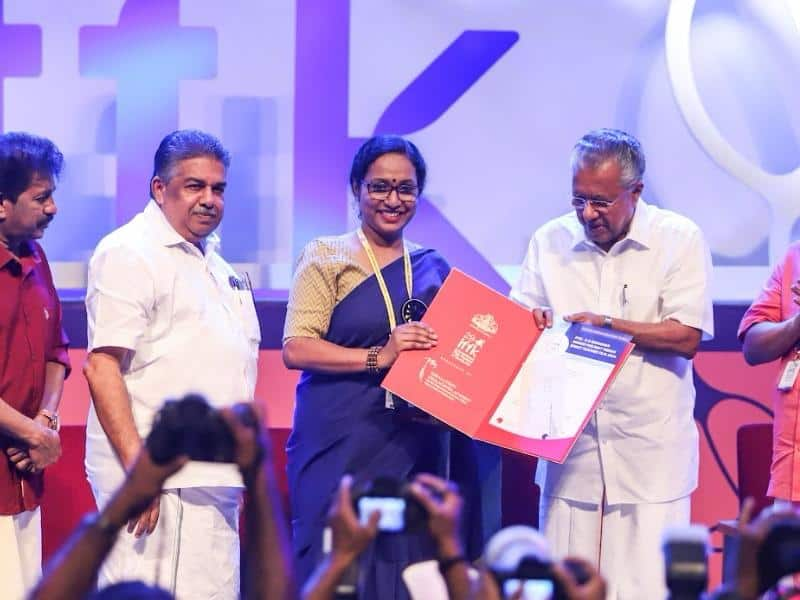 Indu Lakshmi receiving award from Kerala CM Pinarayi Vijayan at IFFK 2024.
Indu Lakshmi receiving award from Kerala CM Pinarayi Vijayan at IFFK 2024.
Lakshmi and others had written about “his (Karun’s) involvement in the film policymaking. He was its chairperson and was heading the conclave after the Hema Committee report. Knowing what happened to us, we couldn’t keep quiet. I was asked to give in an apology, but I refused to. So, the easiest way to silence someone is to file a defamation case against them. But I choose to live with integrity,” she says.
Irony also died a thousand deaths when women interns were the troublemakers on her set of Nila. They were “bought over to give false testimony against me, while the young men in my team showed integrity and stood by me,” says Lakshmi. Her tribulation made her averse to hiring women. Besides her cast, she was the only woman in her crew on Appuram.
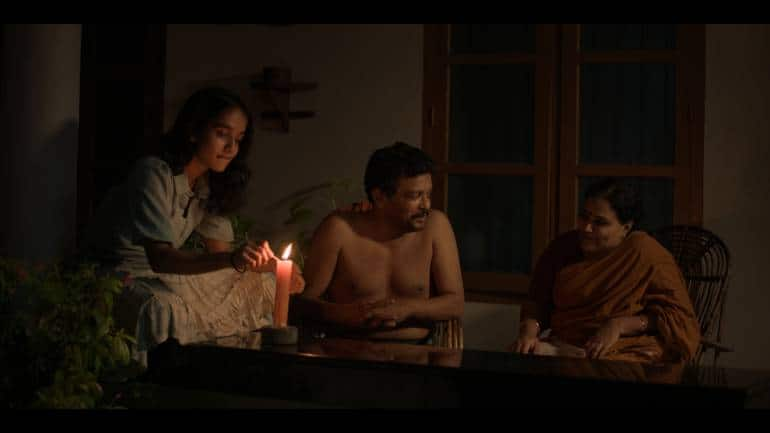 A still from Appuram.
A still from Appuram.
The Kerala state funding for women filmmakers is “definitely a great scheme for women directors,” she says. Although “the (defamation) case is still going on in the court,” adds Lakshmi, who says it has all been a big lesson for her to separate the person from the artist. “Though I still appreciate him as a cinematographer because he’s done brilliant work (Thampu, Kummaty, Esthappan, Chidambaram, Koodevide?), I still wonder how he could achieve those in that era. I really adore that but his directorial films have not connected with me as compared to, say, Adoor’s [Gopalakrishnan] films, which continue to move me,” she says.
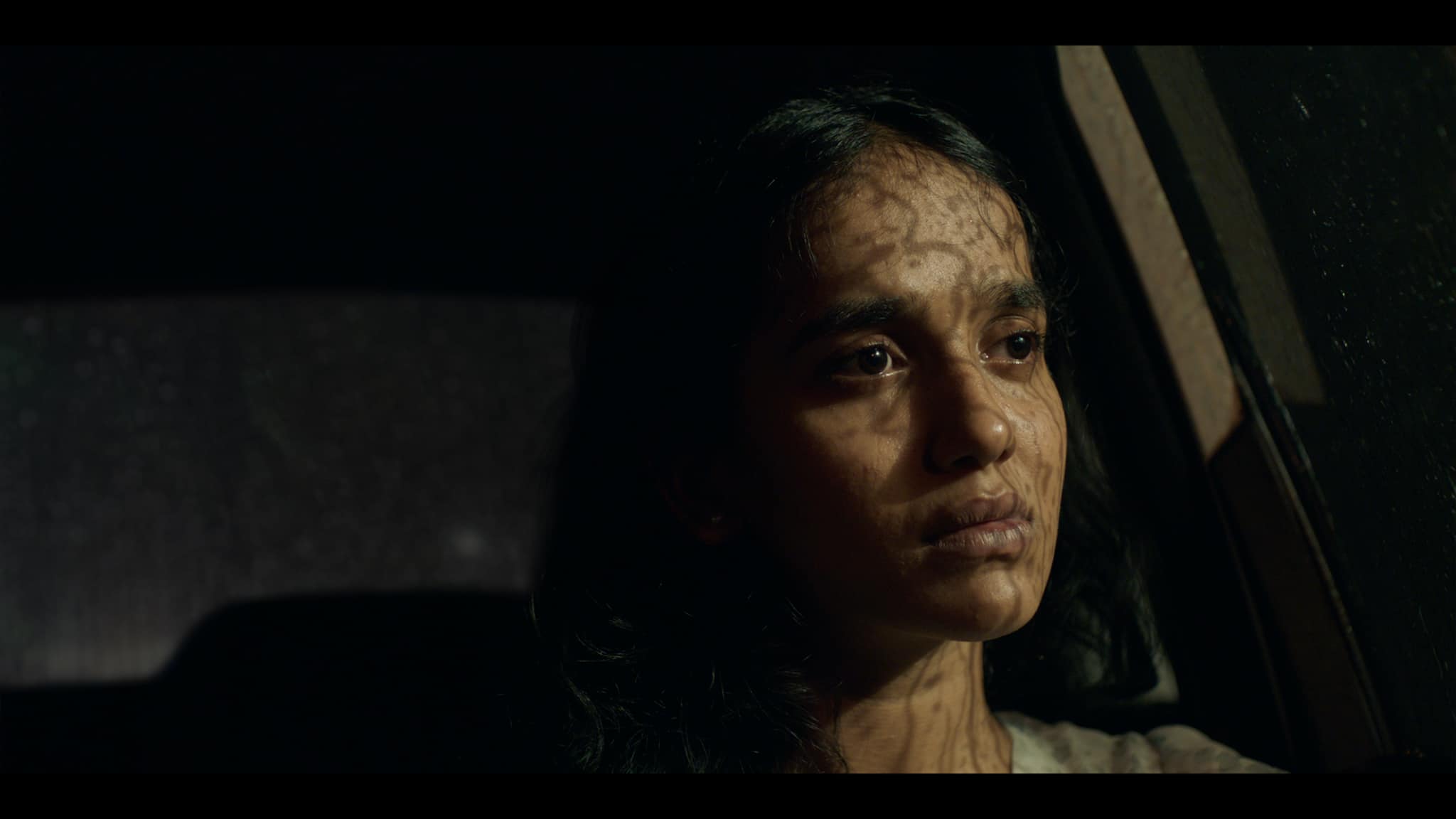 Anagha Ravi in a still from 'Appuram'.
Anagha Ravi in a still from 'Appuram'.
But “those bunch of people (at KSFDC) still talk about me and other women directors as if we are objects, calling us names, talking about our bodies, body structure and what we wear,:" she says, adding, “The perspective of the whole system is that if women get anything or get to do anything, like make a film, it is a big favour on them, a bhiksha (alms) for being loyal, but if a man gets something, it is his ability and talent. We, women, are not dogs. I have moved on and I also know that in spite of this women empowerment initiative, nothing will be done.”
Discover the latest Business News, Sensex, and Nifty updates. Obtain Personal Finance insights, tax queries, and expert opinions on Moneycontrol or download the Moneycontrol App to stay updated!
Find the best of Al News in one place, specially curated for you every weekend.
Stay on top of the latest tech trends and biggest startup news.